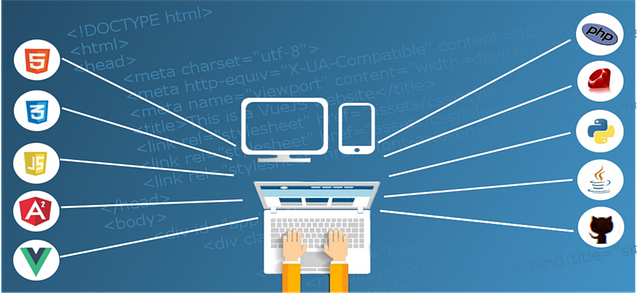What if we were to tell you that you can turn your idea for a tech startup into a reality with absolutely no coding experience at all? That’s right, with no-code platforms, it’s now possible to build applications from scratch without the need to hire developers or code them yourself.
What Are No-Code Platforms?
Before we go into why startups should consider using no-code platforms to develop their apps, let’s take a closer look at how you can create digital customer journeys without any coding skills.
No-code development platforms let you build web-based apps and software using drag-and-drop tools instead of programming languages. They work in a similar fashion to drag-and-drop website builders, which let you create websites without the need to code any HTML, CSS, or JavaScript.
No-code platforms give you control over every step of the app development process, so you can take your app from prototype to production without ever writing a line of code. They also allow you to work through multiple iterations and scale your apps once they’re live.
There are also low-code platforms that, as the name implies, require minimal amounts of code. These platforms still have drag-and-drop functionality but are a good option if you are just getting started with coding and want to write some of the code yourself.
7 Reasons To Consider Using No-Code Platforms for Your Startup
-
Highly accessible
Anyone with an idea for an app can start designing it using a no-code platform. This means that entrepreneurs and startup founders don’t have to wait to hire a technical team or learn to code themselves in order to start building and testing apps.
-
Faster than writing code
Whereas building an app the traditional way can take months of coding, no-code app prototypes can be built in just a few weeks. The drag-and-drop functionality of no-code platforms make it incredibly fast and easy to turn your vision for an app into something tangible, so you can start iterating and improving it for widespread use very quickly.
-
Cheaper than coding
Hiring developers is expensive, and coding an app takes a lot of time (and time = money). So, when you can build an app yourself in such a short amount of time using no-code technology, you’re saving a ton of money on the development process.
-
Ideal for early-stage development
Though you might eventually need to start coding to get all the functionality out of an app that you want, no-coding it first lets you test it out and see if your idea is something really worth investing time and money in. That way, you don’t end up with something you’ve sunk a bunch of resources into that turns out to be a flop.
-
Cost-effective way to make internal apps
No-code development is also a great choice for making apps that you want to use internally within your company. For instance, if you have an insurance company, you can develop a no-code insurance platform that your employees can use for CRM or any other application that you require.
-
Can make your startup more competitive
Startups are often limited by resources, and those with more resources are more competitive on the market. However, no-code technology allows you to turn a concept into a functional prototype with limited resources, meaning you can punch above your weight when it comes to the competition.
-
Improve business efficiency
Sending simple coding tasks to your IT team can jam them up and prevent them from working on more complex projects that really require their expertise. No-code platforms allow anyone in your company to develop and tweak apps with no coding required, thereby helping to eliminate bottlenecks and improve overall productivity.
Is No-Code Development the Future?
There’s no doubt that no-code platforms are here to stay. They provide a wide range of benefits that businesses of all sizes can take advantage of. The limited amount of time, money, and skills make no-code development an especially appealing solution for startups and small businesses with limited resources and access to professional programmers.
That being said, drag-and-drop development does have its limitations, meaning that there will always be a place for traditional coding in app development. Companies with the ability to hire developers and the need for complex applications will still find traditional development to be a more robust option.
However, no-code platforms provide an option for entry-level app development that was previously unavailable for many, allowing anyone with a vision for an app to bring it to life. We’re sure to see more companies resorting to drag-and-drop app builders to create internal apps and solve business problems, too.
If you have an idea for a startup app, but you don’t have any knowledge of coding languages, why not try out a no-code tool to design, launch, and test it? You just might have the next winning idea that gets acquired by Google or Facebook!

